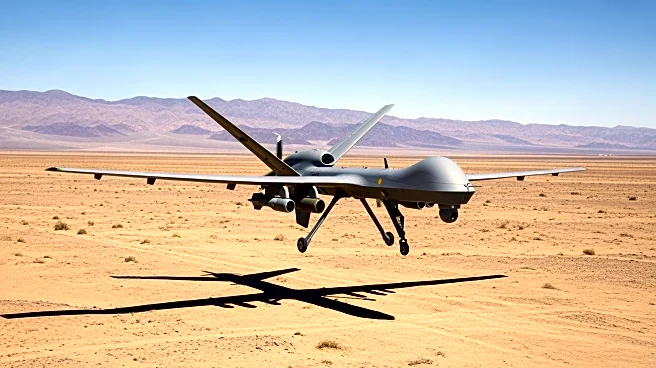What's Happening?
The United States has intensified its military presence in the Caribbean, particularly near Venezuela, as part of a broader strategy to combat drug trafficking and enhance regional security. Satellite
imagery has revealed U.S. military aircraft, including B-52H bombers, operating near Venezuela's coast. The U.S. Southern Command (SOUTHCOM) has expanded its deployments, utilizing El Salvador as a strategic base for operations. This move is part of the Trump administration's efforts to disrupt drug trafficking and protect U.S. interests. The deployment includes advanced aircraft like the AC-130J Ghostrider and Navy reconnaissance planes, which have been conducting missions from El Salvador's main international airport since mid-October. The U.S. has also deployed the USS Gerald R. Ford aircraft carrier to the region, further escalating its military posture.
Why It's Important?
The increased U.S. military presence in the Caribbean underscores the strategic importance of the region in combating drug trafficking and maintaining security. By utilizing El Salvador as a forward base, the U.S. can more effectively monitor and respond to trafficking routes. This move also highlights the geopolitical tensions between the U.S. and Venezuela, as the latter is accused of harboring drug traffickers. The operations have raised concerns about potential violations of international law and the sovereignty of Venezuela. The U.S. strategy aims to deter narco-terrorism and protect its homeland, but it also risks escalating tensions with Venezuela and other regional actors.
What's Next?
There are indications that a military confrontation with Venezuela could occur, although U.S. officials have stated there are no immediate plans for such action. The situation remains tense, with potential diplomatic and military repercussions. The U.S. will likely continue its operations to disrupt drug trafficking, while monitoring the regional response. The international community may scrutinize the legality of these operations, and human rights groups could challenge the U.S. actions. The Trump administration's approach will be closely watched for its impact on U.S.-Venezuela relations and regional stability.
Beyond the Headlines
The U.S. military's actions in the Caribbean reflect broader strategic interests in maintaining influence and security in the region. The use of El Salvador as a base highlights the importance of alliances in executing U.S. foreign policy. The operations also raise ethical questions about the use of military force in drug interdiction efforts and the potential for collateral damage. The situation could lead to long-term shifts in U.S. military strategy and its approach to regional security challenges.









